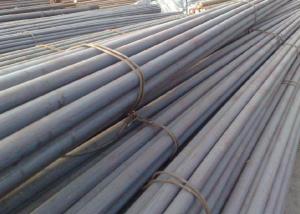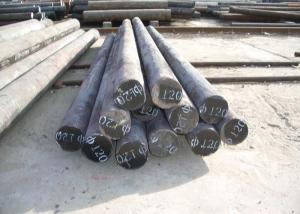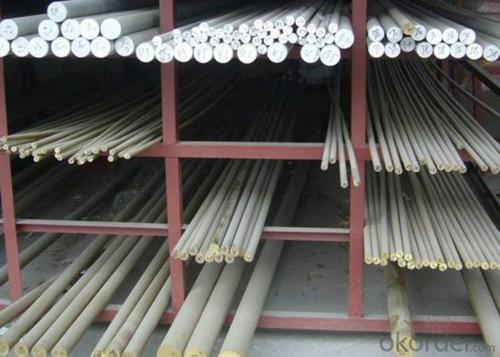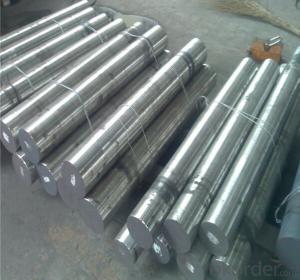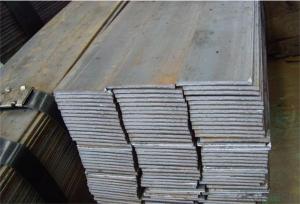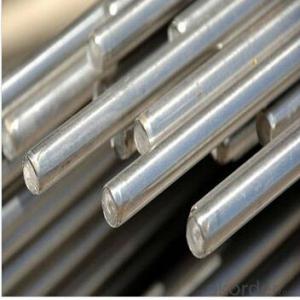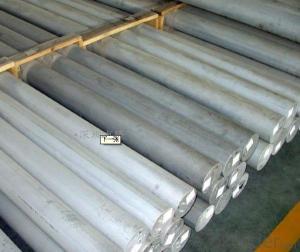Spring Steel Bar
- Loading Port:
- China Main Port
- Payment Terms:
- TT or LC
- Min Order Qty:
- 50Tons m.t.
- Supply Capability:
- 50000TONS /YEAR m.t./month
OKorder Service Pledge
OKorder Financial Service
You Might Also Like
Spring Steel can be divided into two types. One is carbon spring steel, and other one is alloy spring steel.
Alloy spring steel is based on carbon spring steel, by adding one or more alloying elements to improve the mechanical properties, hardenability and other properties to meet the requirement for manufacture all kinds of spring steel.
Specification of Spring Steel Bar:
-Material: SUP6
-Standard: JIS
-Production: Hot rolled or cold rolled
-Type: Spring Steel
-Alloy or no: Alloy
-Micro Structure: Tempered troostite
Corresponding Steel Grade for Reference:
JPN, JIS | CHN, GB | GER, DIN | GBR, BS |
SUP6 | 55Si2Mn | 55Si7 | 251ll60 |
FRA, NF | USA, AISI/SAE | ISO | |
56SC7 | 9260 | 56SiCr7 |
Chemical Composition:
C | Mn | Si | S |
0.56~0.64 | 0.60~0.90 | 1.50~2.00 | ≤0.035 |
P | Cr | Ni | Cu |
≤0.035 | ≤0.35 | ≤0.35 | ≤0.25 |
Mechanical Properties:
-Tensile Strength σb (MPa): ≥1274 (130)
-Yield Strength σs (MPa): ≥1176 (120)
-Elongation δ10(%): ≥5
-Percentage reduction of area: ψ (%): ≥25
-Hardness:
1, Hot rolled, ≤321HB
2, Cold drawn + Heat treatment: ≤321HB
Usage/Applications of Spring Steel Bar:
-This is silicon-manganese spring steel that is used widely. Its strength, elasticity and hardenability are little higher than 55Si2Mn.
- Products of this material are used as flat spring o spiral spring with diameter less than 30mm that bear a large load during the fabrication of trains, cars and tractors.
-The principal material of valve spring.
Packaging & Delivery of Spring Steel Bar:
-Packing Detail: The products can be packed in bundles by steel wires.
-Marks: We will make color marks to make sure that it’s more convenient for customers to distinguish their products from other products at the destination port and we will tie tag marks up to each bundle to make sure that customers know the specifications of each bundle like product’s name and size and other information of products.
-Delivery Detail:
1, Delivery time: 30~45 working days after receive buyer’s T.T. or L/C.
2, Delivery status should be written in the contract. (Heat treatment or no)
Transportation:
1, The products can be delivered by bulk vessel or by container. As for container, products with the length of 6m will be loaded in 20’ container, with 9m or 12m, in 40’ container.
2, The maximum quantity of loading of container is 25 tons.
3, The products are usually transported to the nearest port from the production place.
Photos of Spring Steel Bar:
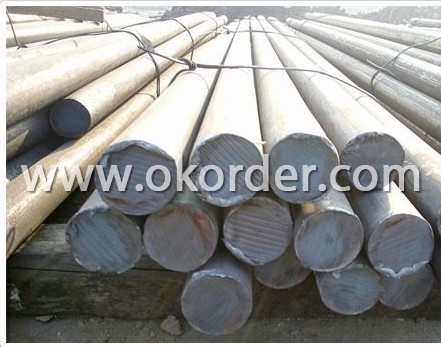
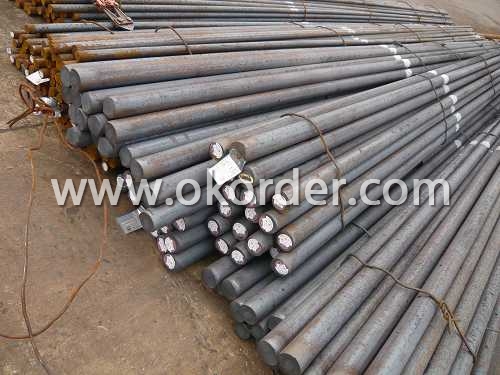
- Q: What are the properties of nickel-based alloys?
- Nickel-based alloys possess several desirable properties, including high strength, excellent corrosion resistance, good thermal stability, and outstanding mechanical properties at elevated temperatures. These alloys also exhibit good electrical conductivity, magnetic properties, and resistance to oxidation. Additionally, nickel-based alloys can be easily fabricated, making them suitable for various applications in industries such as aerospace, automotive, chemical processing, and power generation.
- Q: What are the specific requirements for special steel used in the defense armor industry?
- The specific requirements for special steel used in the defense armor industry include high strength and hardness, excellent toughness, resistance to ballistic impact and penetration, durability, corrosion resistance, and the ability to be fabricated into complex shapes. Additionally, the steel must meet strict quality control standards and be able to withstand extreme conditions such as high temperatures and harsh environments.
- Q: How does aluminum contribute to the properties of special steel?
- Aluminum is commonly added as an alloying element in special steel to enhance its properties. By adding aluminum to steel, several improvements can be achieved. Firstly, aluminum improves the strength of steel by forming a fine dispersion of aluminum nitride particles within the steel matrix. These particles act as barriers to dislocation movement, impeding the deformation of the steel and increasing its strength. This makes the steel more resistant to mechanical stresses and enhances its load-bearing capacity. Secondly, aluminum also enhances the corrosion resistance of steel. It forms a protective oxide layer on the surface of the steel, acting as a barrier against the corrosive agents. This oxide layer prevents the steel from oxidizing, rusting, and deteriorating over time, making it more durable and long-lasting in various environments. Additionally, aluminum can improve the machinability of special steel. Its presence in the steel composition reduces the tendency of the steel to work harden during machining operations. This makes it easier to cut, drill, or shape the steel, resulting in improved productivity and reduced tool wear. Moreover, aluminum contributes to the heat resistance of special steel. It has a high melting point and good thermal conductivity, which helps in maintaining the structural integrity of the steel at elevated temperatures. This makes aluminum-steel alloys suitable for applications where high-temperature resistance is required, such as in the aerospace and automotive industries. In summary, aluminum contributes significantly to the properties of special steel. It enhances the strength, corrosion resistance, machinability, and heat resistance of steel, making it a versatile material with a wide range of applications.
- Q: How is mold steel used in injection molding?
- Mold steel is used in injection molding to create the molds or tooling that are used to produce plastic parts. The steel is used to form the cavity or core of the mold, which determines the shape of the final product. Mold steel is chosen for its high strength, durability, and heat resistance to withstand the high pressures and temperatures involved in the injection molding process.
- Q: How does special steel perform under extreme cold conditions?
- Special steel is specifically designed to perform well under extreme cold conditions. It has excellent resistance to low temperatures and retains its strength and toughness even in freezing temperatures. This is achieved through the addition of alloying elements such as nickel, chromium, and molybdenum, which enhance the steel's ability to remain ductile and resist brittle fracture. In extreme cold temperatures, regular steel tends to become brittle and may fracture easily. However, special steel exhibits remarkable toughness and resilience. It can withstand the extremely low temperatures without losing its mechanical properties, making it suitable for various applications in cold environments. Moreover, special steel also offers excellent corrosion resistance, which is crucial when exposed to extreme cold conditions. Corrosion can be accelerated in cold environments due to factors like moisture, salt, and freezing and thawing cycles. However, the corrosion-resistant properties of special steel prevent it from deteriorating and maintain its structural integrity. Additionally, special steel has superb thermal conductivity, allowing it to efficiently transfer heat even in extremely low temperatures. This characteristic is essential in applications where heat transfer is critical, such as in cryogenic systems or cold storage facilities. Overall, special steel's exceptional performance under extreme cold conditions makes it an ideal material for various industries and applications, including aerospace, oil and gas, automotive, and construction. Its ability to maintain strength, toughness, corrosion resistance, and thermal conductivity at low temperatures ensures reliable and safe operation in severe cold environments.
- Q: Can special steel be used for jewelry?
- Yes, special steel can be used for jewelry. Special steel, such as stainless steel or titanium, is often used in jewelry making due to its durability, resistance to tarnish, and hypoallergenic properties. It is commonly used for crafting earrings, necklaces, bracelets, and rings, providing a sleek and contemporary look for those who prefer an alternative to traditional precious metals.
- Q: What are the different food processing grades of special steel?
- The different food processing grades of special steel include austenitic stainless steel (such as Type 304 and Type 316), ferritic stainless steel (such as Type 430), and martensitic stainless steel (such as Type 410). These grades are commonly used in the food industry due to their corrosion resistance, heat resistance, and ability to maintain hygiene standards.
- Q: What are the advancements and trends in the field of special steel?
- Recent years have seen remarkable progress and emerging patterns in the field of special steel, which have brought about revolutionary changes in various industries. The primary driving force behind these advancements is the increasing demand for high-performance materials in critical applications such as aerospace, automotive, energy, and construction. One of the major breakthroughs in the field of special steel is the development of advanced manufacturing techniques. Conventional steel production methods have been replaced by more efficient processes, such as electric arc furnaces and vacuum induction melting, resulting in improved steel quality and enhanced mechanical properties. These advancements have made it possible to produce special steels with exceptional strength, corrosion resistance, and heat resistance. Another significant trend in the field of special steel is the emergence of new alloy compositions. Researchers and manufacturers are continuously exploring and developing innovative alloying elements to enhance the properties of special steels. For example, the addition of elements like chromium, molybdenum, and vanadium has led to the creation of stainless steels with outstanding resistance to corrosion and oxidation. Furthermore, advancements in heat treatment processes have also been witnessed in the field of special steel. By utilizing advanced heat treatment techniques such as quenching and tempering, austempering, and martempering, special steels can achieve the desired hardness, toughness, and dimensional stability. These advancements have significantly broadened the range of applications for special steels, allowing them to be used in critical components that operate under extreme conditions. In addition to the progress in manufacturing and alloy compositions, there is a growing inclination towards the development of environmentally friendly special steels. With increasing concerns about sustainability and carbon footprint, researchers and manufacturers are focusing on reducing the environmental impact of steel production. This has resulted in the creation of special steels with lower carbon content, as well as the implementation of energy-efficient manufacturing processes. Moreover, the field of special steel is witnessing the integration of digital technologies and automation. The utilization of artificial intelligence, machine learning, and data analytics enables manufacturers to optimize production processes, improve quality control, and reduce costs. This shift towards Industry 4.0 is transforming the production and utilization of special steel, ensuring greater efficiency and precision in the manufacturing process. In conclusion, the field of special steel is experiencing significant advancements and trends that are fostering innovation in various industries. The development of advanced manufacturing techniques, new alloy compositions, improved heat treatment processes, environmentally friendly production methods, and the integration of digital technologies are revolutionizing the properties and applications of special steel. These advancements have not only enhanced the performance and durability of special steel but have also opened up new possibilities for its utilization in critical applications.
- Q: What are the properties of titanium alloys?
- Titanium alloys have several properties that make them highly desirable in various industries. Firstly, they have excellent strength-to-weight ratio, which means they are strong and lightweight. This property makes them suitable for applications where strength and durability are required, such as aerospace engineering. Secondly, titanium alloys have high corrosion resistance, even in harsh environments. They form a protective oxide layer on their surface, which prevents them from corroding. This characteristic makes them ideal for marine and chemical processing industries. Thirdly, titanium alloys have a high melting point, allowing them to withstand extreme temperatures without losing their structural integrity. This property makes them suitable for applications in the automotive, defense, and power generation sectors. Furthermore, titanium alloys are biocompatible, meaning they are well-tolerated by the human body and are often used in medical implants and prosthetics. Overall, titanium alloys possess a unique combination of strength, lightweightness, corrosion resistance, high melting point, and biocompatibility, making them highly valuable and versatile materials in various industries.
- Q: How does tungsten contribute to the properties of special steel?
- Tungsten is a critical element that contributes significantly to the properties of special steel. One of the major benefits of tungsten in steel is its ability to enhance strength and hardness. It forms a solid solution with iron, resulting in a fine-grained microstructure that increases the overall toughness and wear resistance of the steel. Additionally, tungsten helps to improve the high-temperature strength of special steel. It has a high melting point and maintains its strength even at elevated temperatures, making it ideal for applications that require resistance to heat and thermal stress. This characteristic allows special steel with tungsten to be used in environments with extreme temperatures, such as in gas turbines, rocket nozzles, and cutting tools. Tungsten also plays a crucial role in improving the corrosion resistance of special steel. It forms stable carbides that protect against corrosion and erosion, making the steel more durable and long-lasting. This is particularly valuable in industries where the steel is exposed to corrosive environments, such as chemical processing, marine applications, and oil and gas exploration. Furthermore, tungsten contributes to the machinability of special steel. It helps in reducing the built-up edge during cutting operations, resulting in improved surface finish and longer tool life. This characteristic is highly advantageous in industries that require precision machining, such as automotive, aerospace, and tool manufacturing. In summary, tungsten is a vital element in special steel as it enhances strength, hardness, high-temperature performance, corrosion resistance, and machinability. Its unique properties make it an indispensable component in the production of high-quality steel used in various industries.
1. Manufacturer Overview
| Location | Jiangsu, China |
| Year Established | 2003 |
| Annual Output Value | Above US$ 30 Million |
| Main Markets | Asia-Pacific; Middle east |
| Company Certifications |
2. Manufacturer Certificates
| a) Certification Name | |
| Range | |
| Reference | |
| Validity Period |
3. Manufacturer Capability
| a) Trade Capacity | |
| Nearest Port | Shanghai. |
| Export Percentage | 20% - 30% |
| No.of Employees in Trade Department | 10-20 People |
| Language Spoken: | English; Chinese |
| b) Factory Information | |
| Factory Size: | Above 100,000 square meters |
| No. of Production Lines | 2 |
| Contract Manufacturing | OEM Service Offered; |
| Product Price Range | Average |
Send your message to us
Spring Steel Bar
- Loading Port:
- China Main Port
- Payment Terms:
- TT or LC
- Min Order Qty:
- 50Tons m.t.
- Supply Capability:
- 50000TONS /YEAR m.t./month
OKorder Service Pledge
OKorder Financial Service
Similar products
Hot products
Hot Searches
Related keywords

